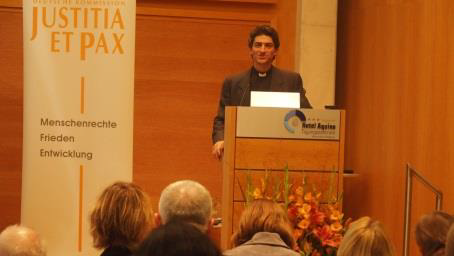Celebration of the 50th anniversary of the German Commission for Justice and Peace (19-20 Oct 2017, Berlin)

(Illustration and design of the postage stamp: Professor Peter Krüll, Kranzberg)
“Thinking of the common good worldwide – Going new ways of development” was the motto of the celebration of the 50th anniversary of the German Commission for Justice and Peace which took place in Berlin from 19-20 October 2017. More than 150 guests from the world of politics and the Church had come to celebrate the event.
The German Commission for Justice and Peace is the joint institution of the German Bishops‘ Conference and the Central Committee of German Catholics for promoting development, human rights and peace.
Three participants who took part in the Launching Seminar of the global proposal “The Future of Work, Labour after Laudato Sì” in Geneva, Switzerland between 11 and 13th July 2017 reflected and debated during this important event.
From Populorum Progressio to Laudato Si‘ – Guide to a Just World Order
The Director for Development and Faith at the Roman Dicastery for Promoting Integral Human Development, Rev. Dr Augusto Zampini-Davies, had come instead of Cardinal Turkson and in his lecture he drew the path of the social doctrine of the Church from Populorum Progressio to Laudato Si‘.
50 years ago, Pope Paul VI with Populorum Progressio, On the Development of Peoples, gave an answer to the most pressing questions of development. Contrary to the opinion that development (or progress “progressio”) is a synonym for economic growth, which was already dominant in 1967, the Pope advocated a holistic approach that sees peace only realized in the context of international development. Development of people meant all people, the whole person and the social integration of all. Such a model harbours counter dynamics against those models that produce violence, inequality and destruction. According to Zampini the Church’s task now is to think and spread an alternative, economic and political global system.
With his social encyclical Laudato Si‘, Pope Francis also emphasises the importance of integral development and brings the level of ecology into focus. The system of economic growth will lead to its own downfall, if it dissipates and wastes its resources, nature and people. Climate change and enormous inequalities prove this. We need an intensive dialogue at all levels where the poorest and most vulnerable are heard.
Zampini underlined Pope Francis‘ focus on the environment. Often, environmental pollution, e.g. water pollution in cities and rural areas, is the cause of poverty, illness and death. Droughts, for example in the sub-Saharan region or in Syria, harbour potential conflicts that lead to violence and flight. The answer is the promotion of an integral ecology as a paradigm of a fundamental relationship of the person with God, with him/herself, with other people and with creation. An integral ecology goes beyond the political, because changing strategies and attitudes demand a change of heart. The recognition of one’s own mistakes and sins and the associated personal conversion and responsibility are necessary and, at the same time, insufficient. World politics are also called upon to create structures that organize participation at all levels of politics and that focus on integral development.

Public expert discussion on decent work and global value chains
“Re-thinking Labour“ Fr. Pierre Martinot-Lagarde SJ from the ILO called for a redefinition of work and productivity. Care work for society, for nature and for fellow human beings has played a role that has so far been scarcely taken into account in all societies. Globalisation today is taking place in a context of greater fragmentation, division of labour and increased violence. The ILO, on the other hand, emphasizes its fundamental values and social ethical principles and thus becomes no less important than when it enters the second century of its existence.
The means of choice is social dialogue, if social justice and social peace are to be maintained.
The contribution by Professor Dr. Nicola Piper, an Australian migration expert, focused on the highly precarious situation of migrant workers. Many of them are not registered and work informally, thus making exploitation – from trafficking in human beings to wage retention – easy. Labour rights are not enforceable for many, because there are hardly any human rights institutions in the ASEAN region, for example. Against this background, Professor Piper praises international processes and organisations, especially the ILO. Its Convention C 189 on the protection of the rights of domestic workers, which includes migrant workers, is considered to be an outstanding positive example.
Please visit the German Commission for Justice and Peace website at www.justitia-et-pax.de and to download statements and press releases click on ”aktuell” or “Presse“.

